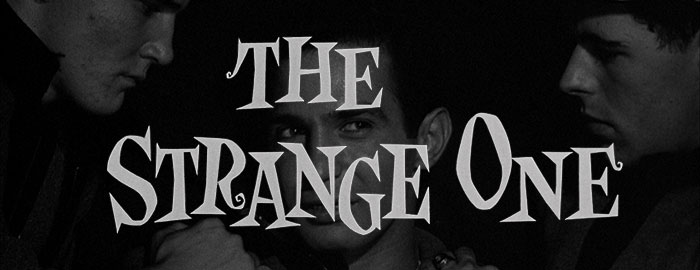
B&W, 1957, 99 mins. 45 secs.
Directed by Jack Garfein
Starring Ben Gazzara, Pat Hingle, Peter Mark Richman, Arthur Storch, Clifton James, George Peppard
Indicator (Blu-ray) (UK RB HD), Sony (DVD) (US R1 NTSC) / WS (1.66:1) (16:9)
Best 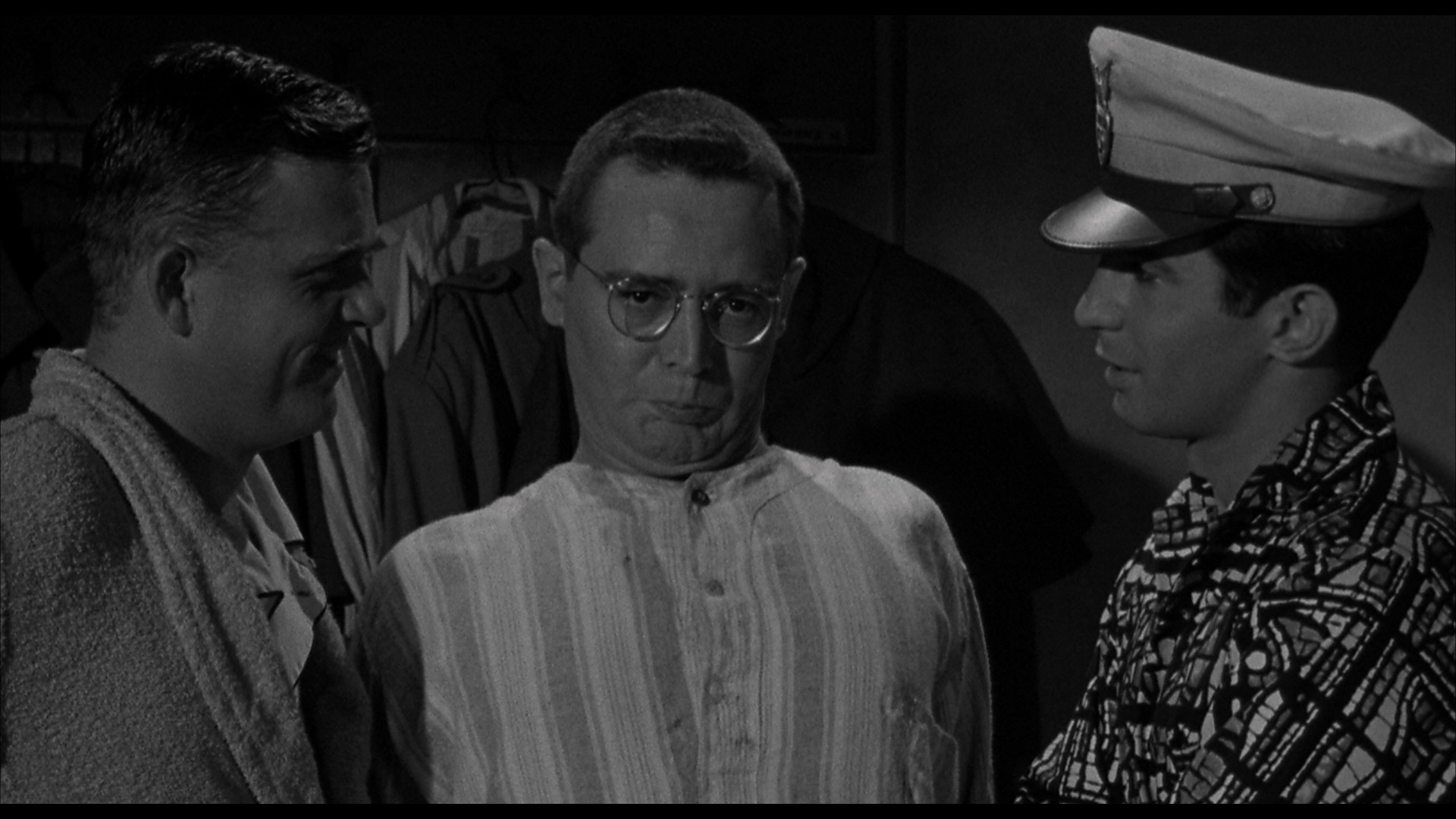 known as a Hollywood screenwriter for
known as a Hollywood screenwriter for 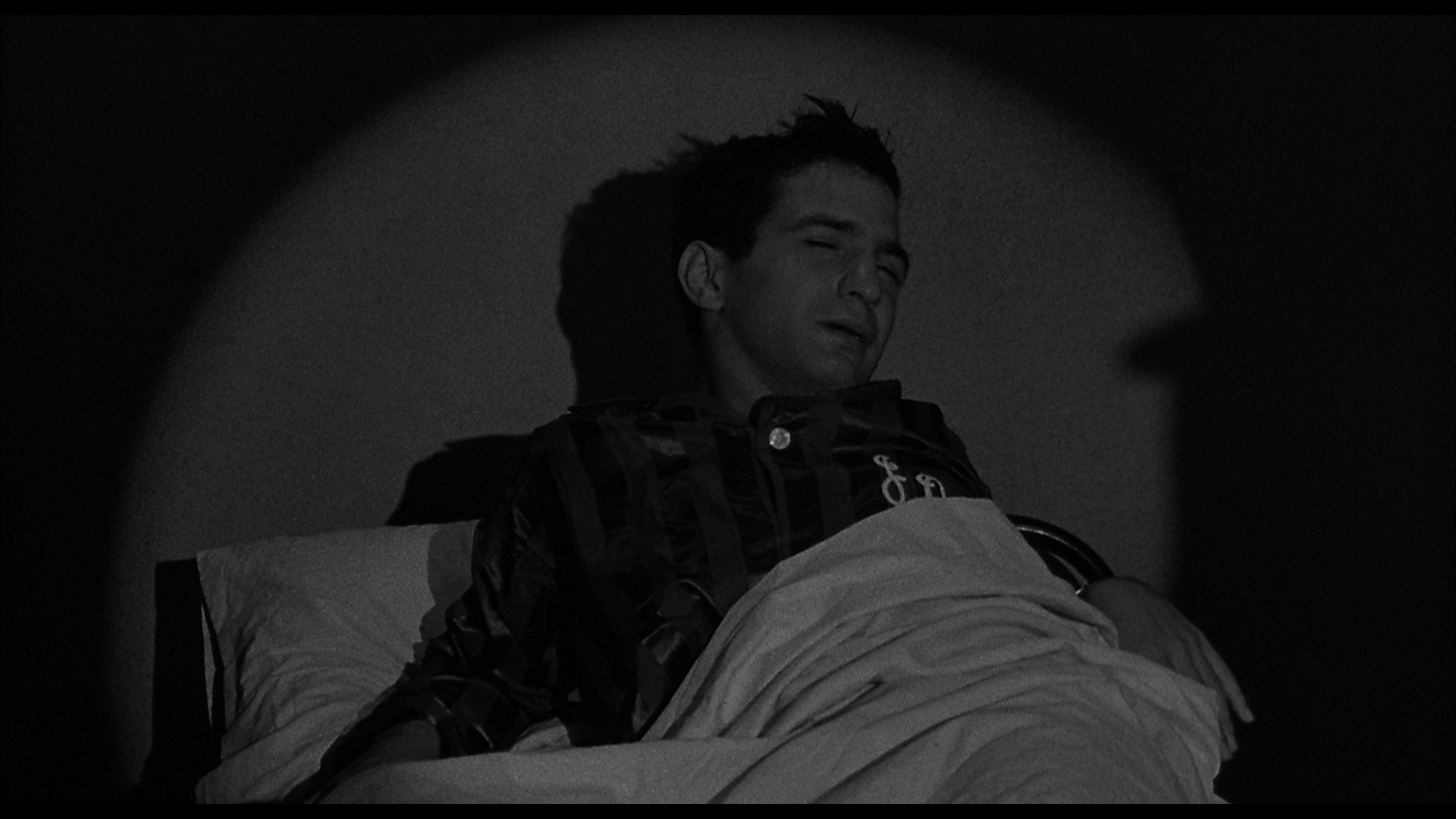 such films as Paths of Glory, The Vikings, and Little Big Man (as well as contentious involvement in The Graduate), Atlanta-born writer Nobel Willingham started off his career with a bang in 1947 with his very controversial debut novel, End As a Man. An edgy look at the toxic culture at military academies, the story shocked readers with its unflinching (for the time) depictions of hazing, mind games, and implied sexualities of all stripes, all of which was more or less retained when it was adapted by Willingham as a stage production culling all of its talent from the Actors Studio (including up and comers James Dean and George Peppard). Columbia took an interest and had Willingham adapt it again as a feature film, this title retitled The Strange One, which pushed the envelope about as far as Hollywood would allow. Again the film relied on Actors Studio talent, with an up and coming Ben Gazzara taking the lead role. The film proved to be an eye opener for many viewers and went on to inspire several subsequent works, most notably Pat Conroy's The Lords of Discipline.
such films as Paths of Glory, The Vikings, and Little Big Man (as well as contentious involvement in The Graduate), Atlanta-born writer Nobel Willingham started off his career with a bang in 1947 with his very controversial debut novel, End As a Man. An edgy look at the toxic culture at military academies, the story shocked readers with its unflinching (for the time) depictions of hazing, mind games, and implied sexualities of all stripes, all of which was more or less retained when it was adapted by Willingham as a stage production culling all of its talent from the Actors Studio (including up and comers James Dean and George Peppard). Columbia took an interest and had Willingham adapt it again as a feature film, this title retitled The Strange One, which pushed the envelope about as far as Hollywood would allow. Again the film relied on Actors Studio talent, with an up and coming Ben Gazzara taking the lead role. The film proved to be an eye opener for many viewers and went on to inspire several subsequent works, most notably Pat Conroy's The Lords of Discipline.
At a Southern military school with more than its share of well-connected cadets, the darkly charismatic Jocko De Paris (Gazzara) manages to get away with brutalizing new initiates and working his upper classman status to his own advantage. First seen conniving with fellow cadet Harold (Hingle) to pull a nocturnal surprise on two freshmen (complete with harsh language like "What a fantastic creep"), Jocko is building up to an elaborate revenge plot against his 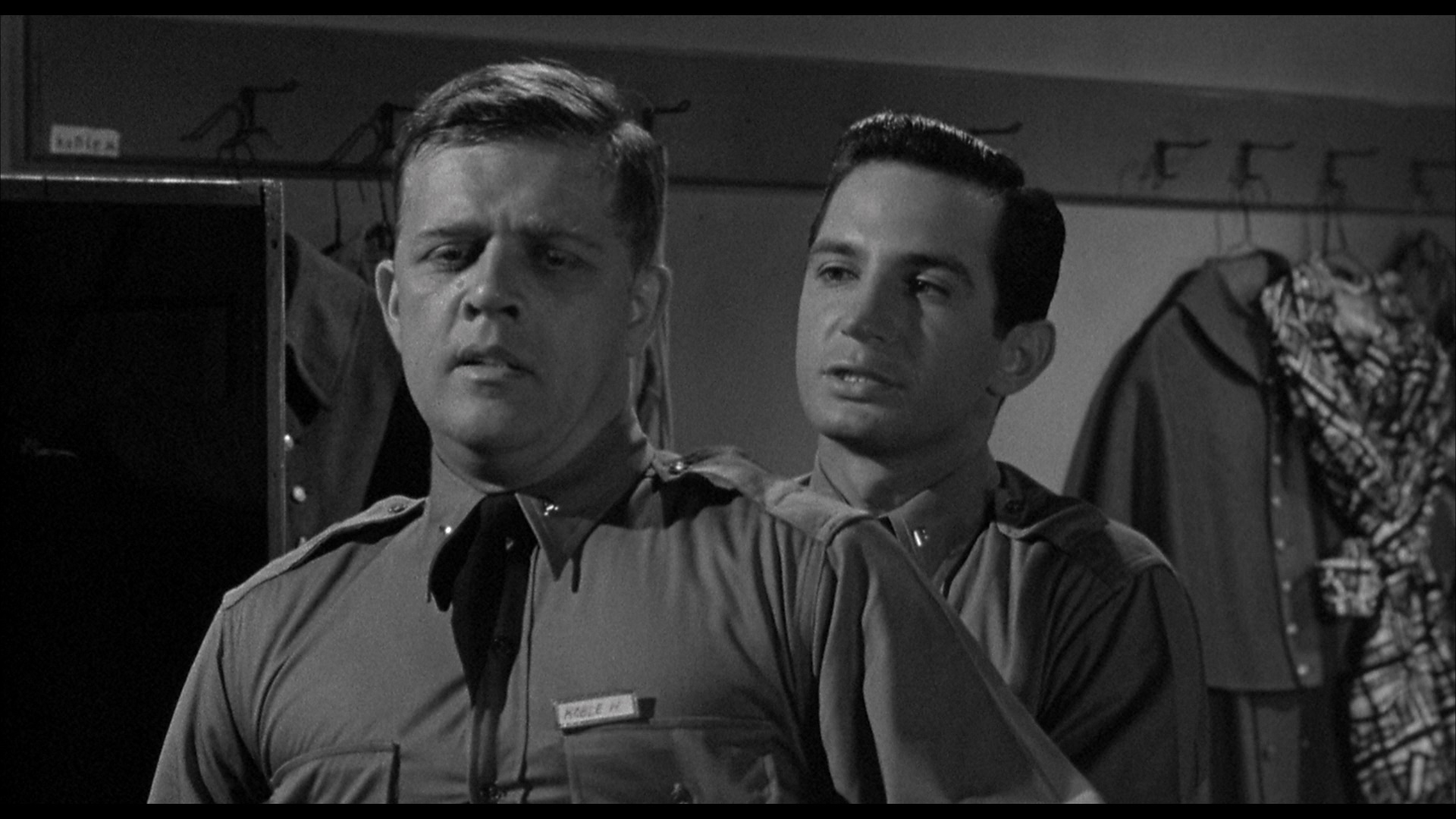 biggest rival to frame him for what appears to be a
biggest rival to frame him for what appears to be a 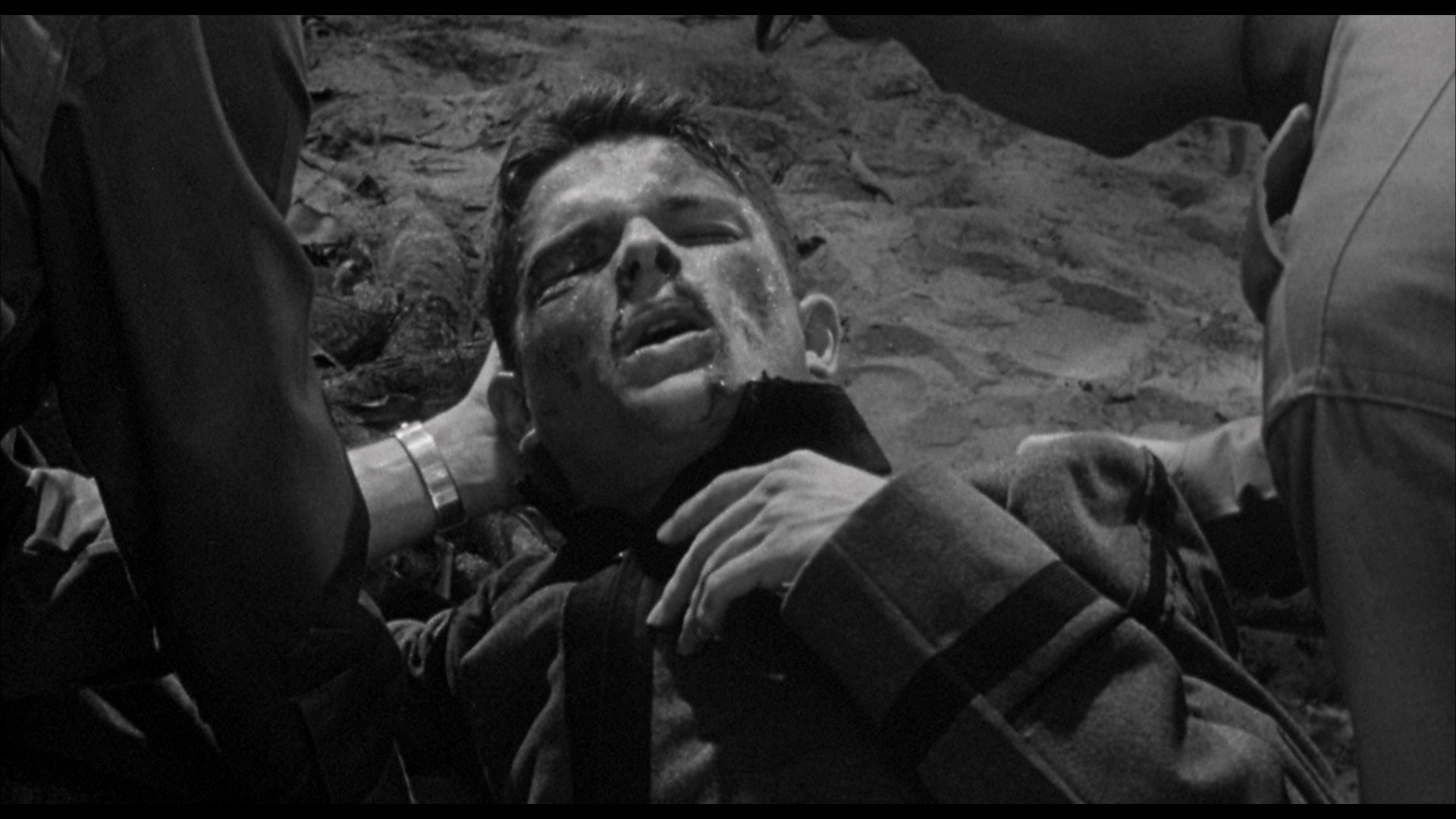 night of public drunken excess. The ploy seems to work, and Jocko's arrogance continues to grow with his compatriots more determined than ever to break his stranglehold.
night of public drunken excess. The ploy seems to work, and Jocko's arrogance continues to grow with his compatriots more determined than ever to break his stranglehold.
Impeccably cast across the board with a number of standout performances (including a wonderfully weaselly Arthur Storch from The Exorcist showing off some convincing fake buck teeth), The Strange One is still a potent viewing experience with an undeniable undercurrent of warped sexuality running throughout. The fact that it sports an overt gay character among the cadets goes some way to deflect attention to the weirder tensions between Jocko and his classmates whom he seems to enjoy humiliating and spanking (even lovingly caressing a blade at one point to drive the point home); of course, it all still had to stay within the constraints of the Production Code which means it isn't quite as overt as the source material. Anyone even remotely practiced in reading subtext into films of the era though should have no trouble figuring out what's going on, and it's a unique joy to see a young Gazzara sinking his teeth into the role with the same intensity he would bring to his landmark roles for John Cassavetes.
Initially released on DVD in 2009 from Sony with a solid video interview with Gazzara (10m38s) who has since passed away, The Strange One made its global Blu-ray debut from Indicator in a limited 3,000-unit Region B edition. The fresh HD scan looks excellent and goes a solid job of capturing the shadowy cinematography, which goes some way to dealing with what amounts to fairly stagy material. The film can be viewed in either the standard U.S. version or with the rarely seen U.K. opening credits retaining the End as a Man title. The DTS-HD MA English mono track (with features 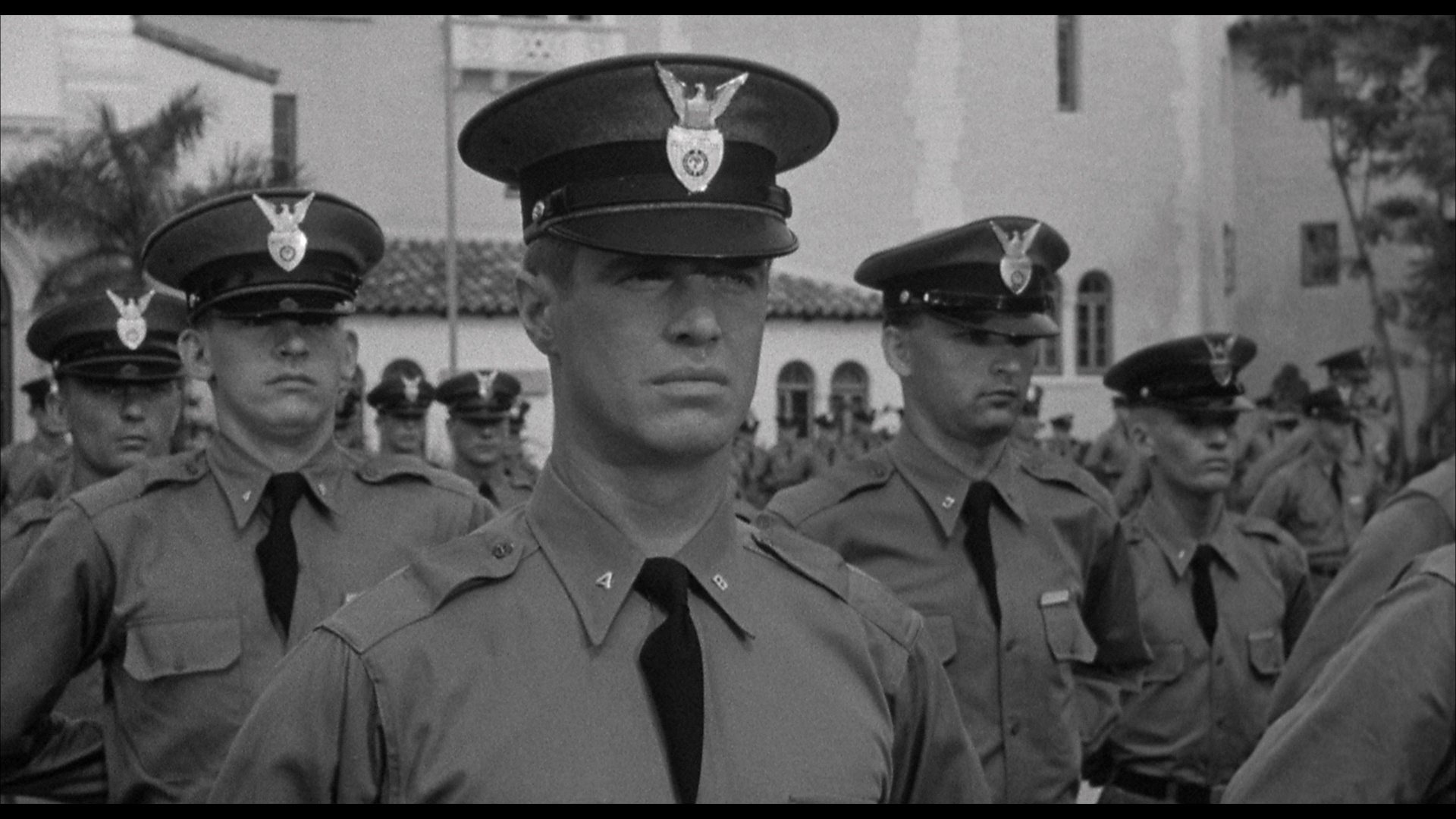 new and improved English SDH subtitles) sounds great and gives some nice heft to the jazzy
new and improved English SDH subtitles) sounds great and gives some nice heft to the jazzy 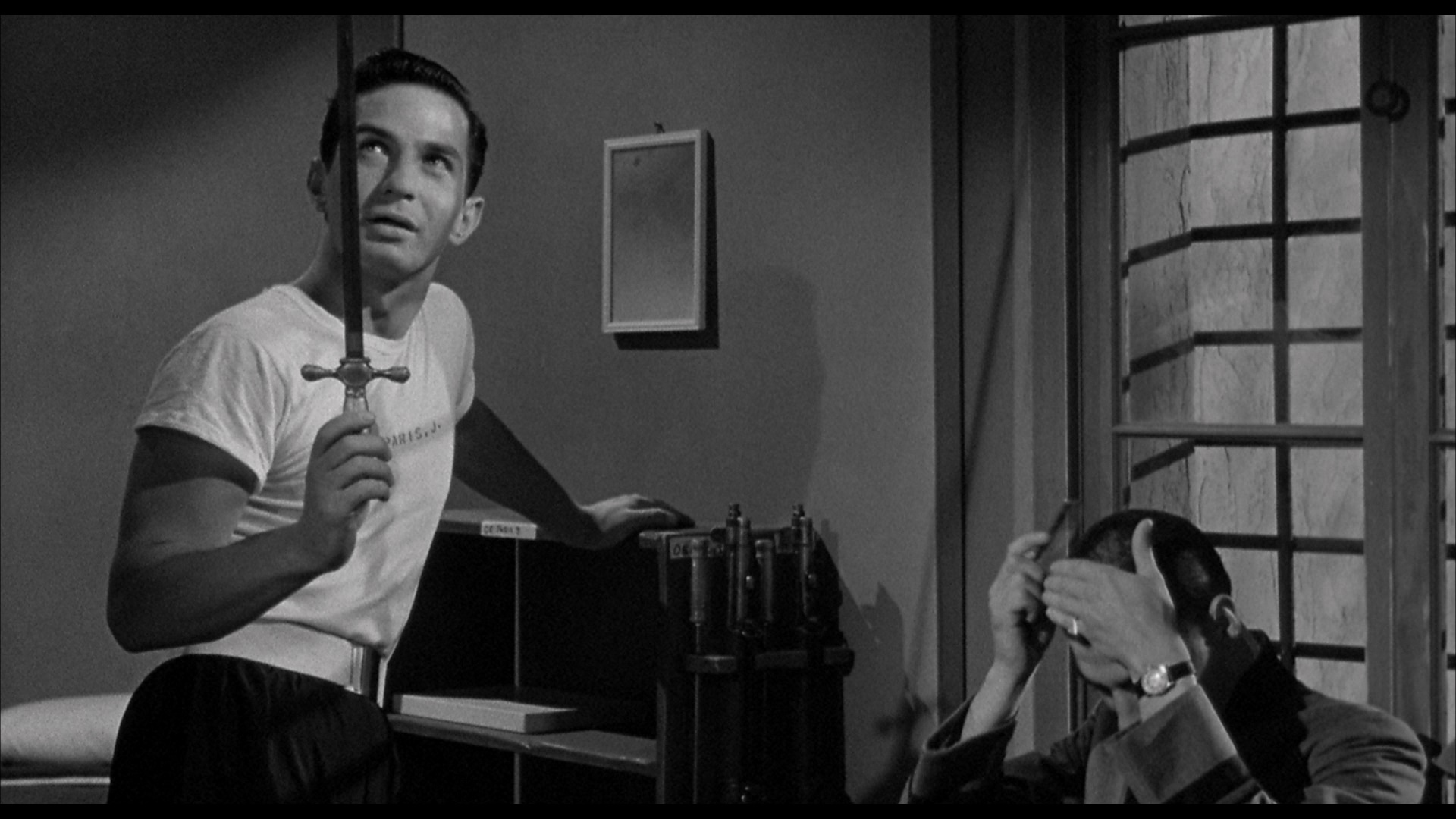 score by Kenyon Hopkins. A new audio commentary by Nick Pinkerton does a fine, well researched job of dissecting the film, including an amusing comment about the Saul Bass-lite opening credits and plenty of detail about the cast and crew. He also has a good handle on the multiple layers going on in the dialogue including some pretty edgy sexual references that probably slipped right by the censors (mainly involving comments about gag reflexes and splitting people in half). He also touches on the changes from the play including the removal of a key character point for Jocko and a significant change in the ending from a tribunal one to a sort of lynch mob. Apart from his odd way of pronouncing "Sidney Lumet," it's a great listen and a very welcome companion to the main feature. The Gazzara featurette is ported over here and still makes for a good watch (especially his fleeting moment of throwing shade at James Dean for trying to swipe the lead role), while "Finding Direction" (10m11s) features director Jack Garfein recalling his days with the Actors Studio, his experience with the play, getting the film thanks to Elia Kazan, and the harrowing background as a teenage Auschwitz survivor that impacted his entire life. The somewhat clunky theatrical trailer is also included along with a gallery of 17 stills and promotional items. As usual, the insert booklet is a major extra itself complete with new liner notes by Brad Stevens, a text reminiscence from Gazzara, an archival Garfein interview, and sample critical reactions.
score by Kenyon Hopkins. A new audio commentary by Nick Pinkerton does a fine, well researched job of dissecting the film, including an amusing comment about the Saul Bass-lite opening credits and plenty of detail about the cast and crew. He also has a good handle on the multiple layers going on in the dialogue including some pretty edgy sexual references that probably slipped right by the censors (mainly involving comments about gag reflexes and splitting people in half). He also touches on the changes from the play including the removal of a key character point for Jocko and a significant change in the ending from a tribunal one to a sort of lynch mob. Apart from his odd way of pronouncing "Sidney Lumet," it's a great listen and a very welcome companion to the main feature. The Gazzara featurette is ported over here and still makes for a good watch (especially his fleeting moment of throwing shade at James Dean for trying to swipe the lead role), while "Finding Direction" (10m11s) features director Jack Garfein recalling his days with the Actors Studio, his experience with the play, getting the film thanks to Elia Kazan, and the harrowing background as a teenage Auschwitz survivor that impacted his entire life. The somewhat clunky theatrical trailer is also included along with a gallery of 17 stills and promotional items. As usual, the insert booklet is a major extra itself complete with new liner notes by Brad Stevens, a text reminiscence from Gazzara, an archival Garfein interview, and sample critical reactions.
Reviewed on May 3, 2020
![]()